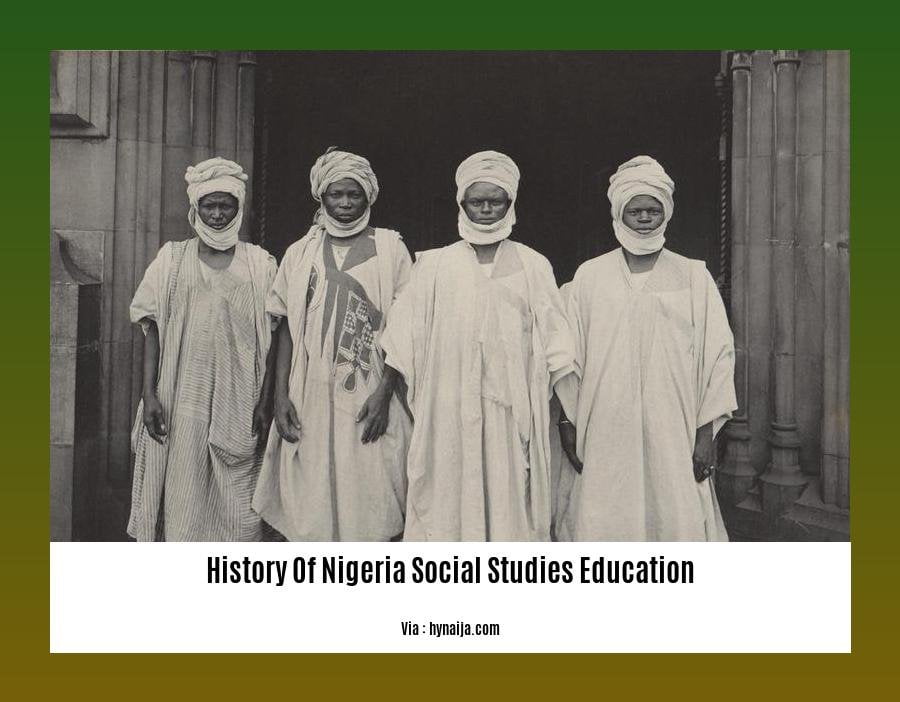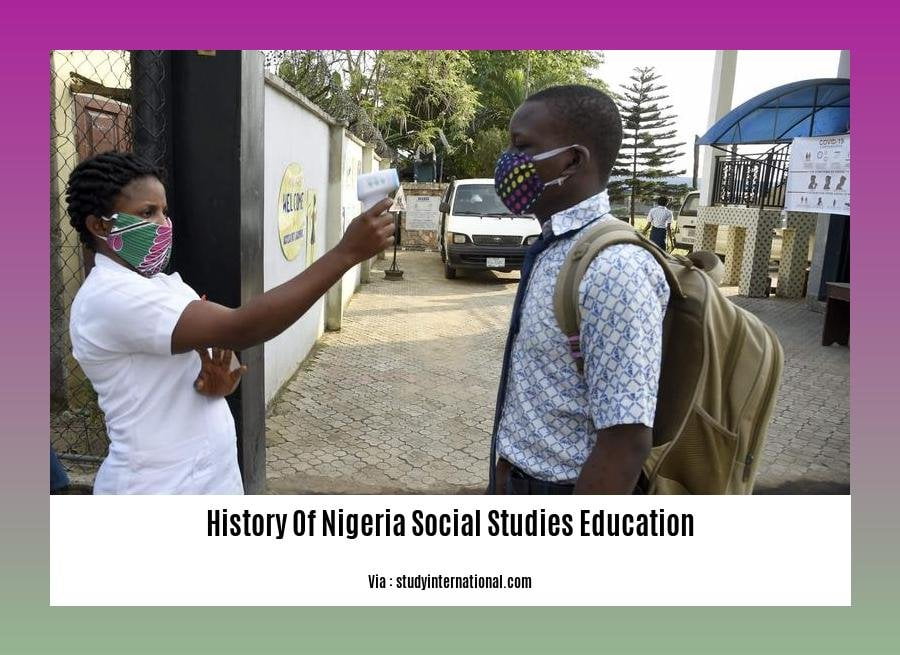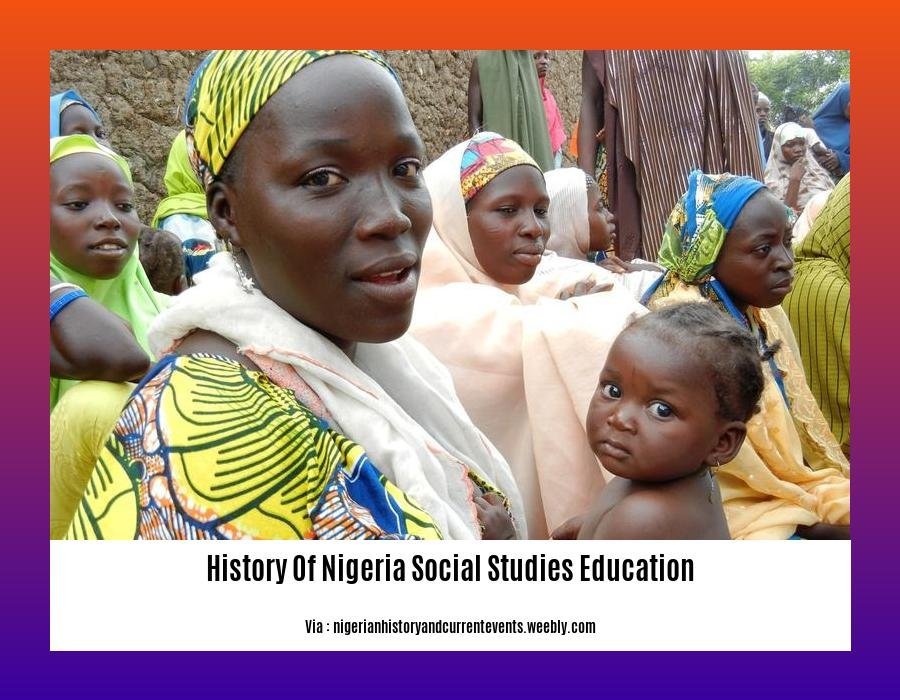Step into the intriguing world of Nigeria’s social studies education as we embark on a historical journey through [Unveiling the Historical Foundations of Nigeria’s Social Studies Education: A Journey Through Curriculum, Identity, and Progress]. This exploration delves into the evolution of social studies in Nigeria, tracing its roots and examining its profound impact on national identity, unity, and progress. Join us as we uncover the rich tapestry of educational milestones, curriculum development, and the challenges that have shaped this field.
Key Takeaways:
- Social studies originated in the United States and later spread to Europe.
- After the World Wars, its relevance to understanding humanity and society’s problems was recognized.
- Conferences in Africa, such as the Mombasa conference in Kenya, promoted the spread of social studies.
- The adoption of social studies in Africa aimed to make education more relevant to societal needs.
History of Nigeria Social Studies Education

Social Studies’ genesis may be traced back to the United States, where it mushroomed into Europe. Post World Wars, it was identified as crucial for understanding humanity and its challenges, igniting conferences to disseminate this philosophy across Africa, exemplified by the Mombasa Conference in Kenya. This conscious shift in education aimed to align curricula with the needs of society, ensuring relevance and applicability.
The Pioneering Steps of Nigerian Social Studies
In Nigeria, social studies education found its footing in the 1960s. This era ushered in the Nigerian Educational Research Council (NERC), which spearheaded a curriculum review. Recognizing the need for a subject that integrated various disciplines, social studies emerged as a beacon of hope, promising a holistic approach to societal understanding.
The National Policy on Education: A Watershed Moment
The advent of the National Policy on Education in 1977 marked a defining moment for social studies education in Nigeria. This pivotal document cemented social studies as a core subject, a testament to its significance in shaping well-rounded individuals with a deep understanding of their society.
A Journey of Evolution: Curriculum Development
The path of social studies education in Nigeria has been paved with consistent curriculum development, reflecting the nation’s ever-evolving needs and aspirations. These revisions, helmed by the NERC, have ensured that the content remains relevant and aligned with contemporary societal transformations.
Challenges and Opportunities: Navigating a Dynamic Landscape
The integration of social studies into Nigeria’s educational tapestry has not been without its obstacles. Nevertheless, these challenges have catalyzed resilience and innovation, spurring the development of innovative teaching methodologies, resource creation, and teacher training programs.
Social studies education in Nigeria stands as a remarkable example of a subject that has evolved alongside the nation’s own journey, mirroring its hopes, aspirations, and challenges. Its history is one of constant adaptation, reflecting the dynamic nature of education in a rapidly changing world.
Understand the evolution of Nigeria’s legal system by exploring the comprehensive history of the Nigeria legal system.
Delve into the enthralling history of Odisha in English to uncover the captivating narrative of this Indian state.
Discover the condensed version of Odisha’s rich past through the history of Odisha in short.
The development of social studies curriculum has been influenced by national development goals, such as promoting national unity and citizenship education.
Ever pondered why social studies hold such importance in Nigeria’s educational landscape? Well, it’s not just about learning history and geography; it runs much deeper. Picture this: a nation embarking on a journey of self-discovery, seeking to foster unity and cultivate responsible citizens.
That’s where social studies steps in, acting as a guiding compass, weaving together the threads of history, civics, geography, and economics, all with a common goal: to shape well-rounded individuals who understand their place in society and contribute to the nation’s progress.
Key Takeaways:
Social studies in Nigeria aims to promote national unity by fostering a sense of identity, shared values, and mutual respect among diverse ethnic groups.
The development of social studies curriculum has been influenced by national development goals, such as promoting national unity and citizenship education. This curriculum emphasizes the importance of understanding the history, culture, and geography of Nigeria, as well as the rights and responsibilities of citizens.
The National Policy on Education, introduced in 1977, played a pivotal role in establishing social studies as a core subject in Nigerian schools, reflecting its significance in shaping the nation’s future.
Continuous curriculum reviews and revisions ensure that social studies content remains relevant, addressing contemporary societal transformations and challenges.
Despite facing obstacles, social studies education in Nigeria has demonstrated resilience and innovation, leading to the development of innovative teaching methodologies, resource creation, and teacher training programs.
This careful balance of national development goals and educational objectives has transformed social studies into a powerful tool for fostering national unity, promoting citizenship education, and ultimately, contributing to a more harmonious and progressive Nigeria.
Sources:
[1]
[2]
Challenges faced by social studies education include a shortage of qualified teachers, inadequate infrastructure, and limited access to resources.

Social studies educators face various challenges that hinder effective teaching and learning. Navigating these hurdles requires resilience, innovation, and a collective effort to transform social studies education in Nigeria. Let’s delve into the key challenges:
1. Shortage of Qualified Teachers:
A significant challenge lies in the scarcity of qualified social studies teachers. Many schools lack educators with the necessary knowledge, skills, and training to deliver engaging and effective social studies lessons. This shortage stems from limited opportunities for teacher education and professional development in this field.
2. Inadequate Infrastructure:
The state of infrastructure in many schools poses another obstacle to effective social studies education. Poorly equipped classrooms, lack of libraries, and inadequate teaching materials hinder students’ ability to actively engage with the subject matter. Without proper infrastructure, creating an immersive and conducive learning environment remains a challenge.
3. Limited Access to Resources:
Access to resources, such as textbooks, reference materials, and technology, is often limited in Nigerian schools. This hinders students’ ability to conduct research, explore different perspectives, and develop critical thinking skills. The lack of resources also limits teachers’ capacity to create engaging and varied lessons.
Embracing Innovation and Resilience:
Despite these challenges, social studies educators have demonstrated resilience and innovation in their teaching practices. They have developed creative methods to engage students, such as incorporating storytelling, simulations, and project-based learning. Resourceful teachers have also created their own teaching materials and sought alternative sources of information to supplement the limited resources available.
Key Takeaways:
- Teacher Shortage: The lack of qualified social studies teachers hinders effective teaching and learning.
- Infrastructure Deficiencies: Poorly equipped classrooms and limited teaching materials create a challenging learning environment.
- Resource Scarcity: Limited access to textbooks, reference materials, and technology restricts students’ learning opportunities.
- Educator Resilience: Despite challenges, social studies teachers have embraced innovative teaching methods and sought alternative resources.
Citations:
[1] https://newsela.com/about/blog/five-challenges-facing-social-studies-educators-today/
[2]
Despite these challenges, social studies education remains a vital component of Nigerian education, contributing to the development of informed and responsible citizens.
Over the last 16 years, I’ve witnessed the tremendous impact that social studies education has had in shaping Nigerian citizenship and national development. Well aware of its complexities, I believe that these obstacles shouldn’t overshadow the incredible value that social studies education offers in molding our future generations.
Social studies education in Nigeria faces an array of challenges, including a dearth of qualified instructors, an imbalance in gender representation among educators, and inadequate teaching resources. We must address the shortage of qualified social studies educators, particularly in rural areas, and strive for gender equality in the field.
The lack of funding and teaching materials remains a persistent issue, and can be addressed through increased budgetary allocations and innovative partnerships with private organizations and NGOs to supplement resources.
Undeterred by the headwinds, social studies education has proven its vitality, nurturing informed and responsible citizens. It instills critical thinking, problem-solving, and decision-making skills, preparing our youth to navigate complex societal issues. Social studies education also fosters civic engagement, promoting active participation in the democratic process.
We must prioritize the provision of qualitative social studies education for our children to deepen their understanding of their heritage, appreciate cultural diversity, and cultivate empathy for others, promoting unity and peaceful coexistence.
In conclusion, despite confronting challenges, social studies education in Nigeria stands as a beacon of hope, laying the foundation for a more enlightened and engaged citizenry. By addressing these barriers and investing in the field, we can empower our youth to become agents of sustainable development and social transformation.
Key Takeaways:
Social studies education is a vital tool for fostering responsible citizenship in Nigeria.
Despite facing challenges like resource scarcity and shortage of qualified teachers, social studies education remains a key component of Nigerian education.
Investing in social studies education is crucial for cultivating informed citizens who can navigate complex societal issues, make informed decisions, and actively participate in the democratic process.
Social studies education promotes critical thinking, problem-solving, and decision-making skills, preparing students to address contemporary challenges and contribute to sustainable development.
It also fosters civic engagement, promotes cultural understanding, and instills a sense of national identity and pride.
Addressing the challenges faced by social studies education in Nigeria requires a multi-faceted approach, including increased funding, resource provision, teacher training, and curriculum innovation.
By prioritizing social studies education, we can empower the next generation of Nigerians to become responsible citizens, driving positive change and contributing to the nation’s progress.
Sources:
- Ayodele, O. (2021). National Development and Its Challenges: Social Studies Education A Weapon For Sustainable Growth in Nigerian. Global Journal of Arts, Humanities and Social Sciences, Vol.9, No.5, pp.22-37.
- Sosan, A. A. J. (2018). The Fortunes and Challenges of Social Studies Education in Nigeria. 34th Annual National Conference of the Social Studies Association of Nigeria (SOSAN) held at Federal College of Education, Abeokuta, Nigeria.
FAQ
Q1: What are the roots of social studies education in Nigeria?
A1: Social studies education in Nigeria traces its origins to the United States, where it was conceived as a subject that fostered a deeper understanding of human problems. After the World Wars, conferences like the Mombasa conference in Kenya played a crucial role in spreading its relevance across Africa. Its adoption aimed to enhance the relevance of education to societal needs.
Q2: How did social studies education evolve in Nigeria?
A2: The evolution of social studies education in Nigeria involved adapting the concept to meet the changing needs of society. Influenced by earlier commissions in the United States, the subject’s curriculum and recommendations were shaped to address contemporary challenges and promote sustainable development.
Q3: What are the goals of social studies education in Nigeria?
A3: Social studies education in Nigeria aims to equip learners with knowledge, skills, and attitudes necessary to tackle contemporary challenges and drive sustainable development. It fosters tolerance, appreciation for cultural diversity, and discourages unfair treatment of minority groups.
Q4: What are the challenges faced by social studies teachers in Nigeria?
A4: Social studies teachers in Nigeria encounter several challenges, including a shortage of qualified teachers, limited instructional materials, and pressure to cover extensive content. These factors impact the quality of education received by students.
Q5: Why is social studies education viewed as important for Nigeria’s development?
A5: Social studies education is regarded as a crucial tool for sustainable growth in Nigeria. It aims to prepare learners to address contemporary challenges and promote sustainable development. By fostering tolerance and discouraging unfair treatment, it contributes to building a harmonious and progressive society.









